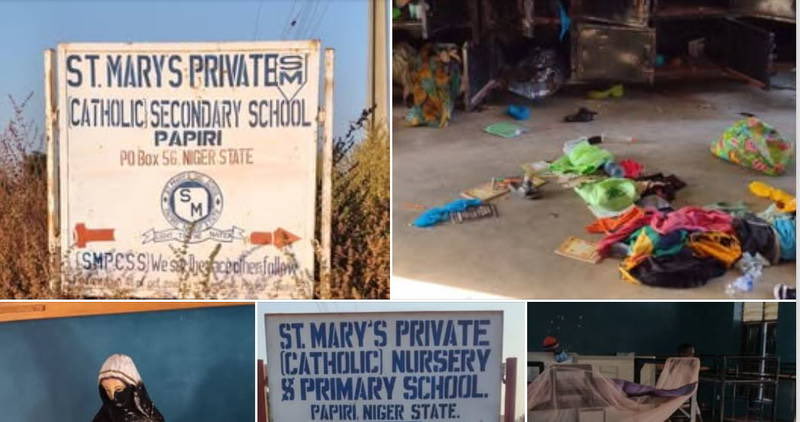
CAN Confirms 227 Abducted From St. Mary’s School in Niger State as Nigeria Faces Another Dark Dawn

Nigeria woke up to one of its most chilling security nightmares on Friday as the Christian Association of Nigeria (CAN) confirmed that 227 people—mostly children—were abducted during a deadly midnight raid on St. Mary’s Catholic Primary and Secondary Schools in Papiri, Agwara Local Government Area of Niger State. The attack, carried out between 2am and 3am, has plunged the nation into yet another round of fear, grief, and bitter questions that authorities have yet to answer.
In the early hours after the incident, confusion clouded the state. Numbers were unclear, families were frantic, and even security agencies struggled to determine just how many children had vanished into the bush under the cover of darkness. But by Friday evening, the situation became heartbreakingly clearer. Daniel Atori, media aide to the Niger State CAN chairman, released the official breakdown: 215 pupils and students and 12 teachers were taken by heavily armed bandits in a coordinated, military-style ambush.
Parents described the night as a horror movie—except this was real. Gunmen stormed the school compound in waves, shattering windows, breaking dormitory doors, dragging terrified children from their beds, and herding them into the forest. Some teachers who tried to shield the students were overpowered, beaten, and forced into the kidnappers’ vehicles. By the time help arrived, the attackers had vanished without a trace, their victims swallowed into the vast forest corridors that have become safe havens for criminal gangs.
This mass abduction is one of the largest school kidnappings since the Chibok and Kankara incidents and signals a chilling resurgence of banditry despite repeated assurances from the federal government that security operations were gaining ground. Residents of Papiri say the attackers arrived on over a dozen motorcycles, each carrying multiple riders armed with AK-47s and RPGs, firing shots in the air to force villagers indoors while they executed the operation with ruthless precision.
Across Niger State, panic has spread like wildfire. Papiri community members are mourning, praying, and waiting for updates that never seem to come fast enough. Many parents have been unable to speak to journalists, their voices drowned in uncontrollable sobs. Some fainted as the full list of abducted children was confirmed. Local vigilantes who chased the bandits deep into the forest returned exhausted and empty-handed, admitting that the criminals had too great a head start and too much knowledge of the terrain.
Nationally, the outrage is immediate—and familiar. Nigerians have begun expressing anger not only at the attackers but at the system that continues to allow such tragedies to occur with alarming frequency. Security analysts warn that schools in remote communities remain soft targets, despite years of promises, committees, and counterterrorism budgets that have yet to translate into lasting safety.
The timing of the attack adds another layer of tension. Just days ago, the country was shaken by the abduction of popular cleric Pastor Femi Lazarus during a live-streamed church service in Kwara State—a crime that left two worshippers dead and heightened fears about escalating violence against religious institutions. And only hours before the school attack, the FCT Police Command was battling a different kind of chaos—dismissing viral claims that Navy officer Lt. Ahmed Yerima escaped an assassination attempt after his confrontation with FCT Minister Nyesom Wike. The rumor mill, fueled by distrust and political tension, has been running wild.
Now another crisis has taken center stage, and this one strikes at the heart of Nigeria’s most vulnerable population: schoolchildren.
The federal and state governments have yet to release detailed statements, but emergency meetings are underway, with military and intelligence chiefs summoned to determine the fastest route to rescue. The Niger State Government is said to be weighing whether to request immediate military reinforcement from neighboring states, as the forest trails used by the kidnappers stretch across multiple geopolitical zones.
Meanwhile, international attention is rapidly turning toward Nigeria again, with human rights groups already issuing early condemnations and calling for urgent intervention. The United Nations Children’s Fund (UNICEF), sources say, is preparing a formal statement as the situation evolves.
For many Nigerians, what happened in Papiri is more than an isolated attack—it is a grim reminder of a cycle of terror that seems unbreakable. From Chibok to Dapchi, Kankara to Kuriga, and now Papiri, schoolchildren remain pawns in a deadly game played by well-armed gangs who exploit the country’s weakest points.
Tonight, Niger State is grieving. Families are in anguish. A nation is furious. And somewhere in the wilderness, 227 innocent people—mostly children who went to school seeking knowledge and a future—are waiting, scared and helpless.
Nigeria is once again confronted with a brutal question: How many more children must disappear before the country finds real answers?
Busterblog will continue to follow this developing story.


